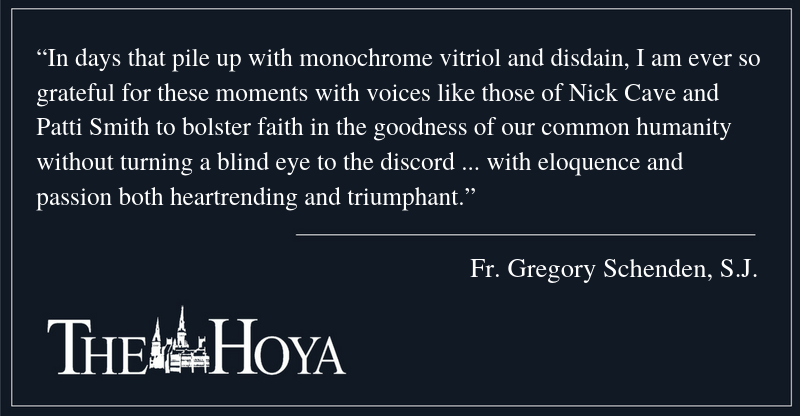In his best-known work, The Republic, Plato advises that there is no place for poets in an ideal society, since the “poet is an imitator, and therefore, like all imitators, thrice removed from … the truth.” Poets, he contends, corrupt youth and rouse emotions instead of reason; poetry “feeds and eats the passions instead of drying them up; she lets them rule, although they ought to be controlled.” My parents would sustain the philosopher’s portent a couple of millennia later whenever I was slipping out to punk shows in the 1980s of my youth in Detroit.
So, it would seem, both to Plato as well as to my parents, most curious and troubling that on two evenings in the past weeks, poetry would provide two moments of beatitude for me. I was blessed these past weeks to turn up at two atypical gigs from two artists whom I’ve long admired and followed — the high priest and priestess of post-punk music and poetry, Nick Cave and Patti Smith. These affairs were not your prescribed concerts; each was an encounter between artist and audience, both spoken and sung, each of remarkable transparency and vulnerability, of heartbreak and humor. By removing the artifice of performing for or at the audience, the wall between performer and audience toppled.
Nick Cave’s career began 40 years ago as the lead singer for the legendary The Birthday Party before venturing solo with his backing group Nick Cave & The Bad Seeds. In those decades, Cave has played the part of punk rock troubadour and lounge singer. Yet it always appeared in part as a ruse for entertainment’s sake. A shift in Cave’s poetic mission came four years ago while recording the album “Skeleton Tree” when his 15-year-old son Arthur died tragically.
During that evening weeks ago at the Lincoln Theatre, Cave shared of having a newfound empathy because of that tragedy and a desire to connect with audiences in a new way — a deeper way — stemming from our common humanity, our suffering and our yearning for something greater on the other side of suffering. Since it was an unfiltered evening of conversation and music, Cave took questions from the audience. When the mother of a child with leukemia stood up simply to thank Cave for the song “Into My Arms,” which had taken on new meaning for her, without a word he walked over to the piano, sat down and played it for her, her son and for all of us with all that we carried with us, as well.
Smith’s poetic vocation commenced memorably and provocatively with the line “Jesus died for somebody’s sins but not mine,” from her cover of “Gloria: In Excelsis Deo” on her 1975 debut album “Horses.” In the decades since, Smith channels in her art the voices of everyone from Maria Callas to Bob Dylan, from William Blake to Arthur Rimbaud. Last week in Lisner Auditorium, Smith engaged in conversation, song and readings from her new dream-fugue memoir-novel “Year of the Monkey,” covering events both public — a presidential election — and private — the deaths of two dear friends — during 2016.
She reminded us of where we are today when she added the line “Look at Mother Nature on the run / In the 21st century” to her solitary cover of Neil Young’s “After the Gold Rush.” Reading from her new book, she offered that “nothing is ever solved. Solving is an illusion. There are moments of spontaneous brightness, when the mind appears emancipated, but this is more epiphany.” They are, in words given to her by her late friend Sandy Pearlman, “shards of love.”
American folk singer Woody Guthrie once stated that music has to be more than just good; it must be good for something. In days that pile up with monochrome vitriol and disdain, I am ever so grateful for these moments with voices like those of Cave and Smith to bolster faith in the goodness of our common humanity without turning a blind eye to the discord … with eloquence and passion both heartrending and triumphant. While not changing public policy, such voices are clarion calls, both prophetic and civil, to cling to the shards of love in our lives and set forth in hope. The urgent call is there — just take the time to listen.
Fr. Gregory Schenden, S.J., is the Catholic chaplain at Georgetown University. As This Jesuit Sees It appears online every other Thursday.














